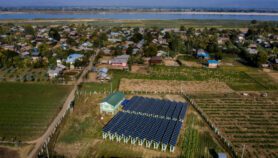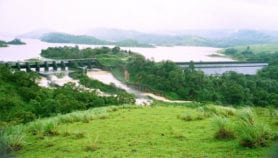Send to a friend
The details you provide on this page will not be used to send unsolicited email, and will not be sold to a 3rd party. See privacy policy.
A third industrial revolution based on new communication and energy technologies needs strong political commitments, argues David Dickson.
Just before Christmas, China's official Xinhua News Agency published an article extolling the virtues of the country's incoming premier, Li Keqiang, and describing his enthusiasm for ideas that the iconoclastic US commentator Jeremy Rifkin put forward in 2011. [1]
Rifkin has written about an emerging "Third Industrial Revolution", based on radical transformations in communications technology on the one hand, and "distributed energy technologies", such as solar power, on the other.
SPEED READ
- China's next premier hails 'third industrial revolution' based on communication and green energy
- Creating an "energy Internet" could transform developing country economies
- But the challenge is social as much as it is technical — change hinges on action from the bottom–up
He argues that the two previous industrial revolutions — the first based on steam–powered machinery, and the second on factory-based mass production and the rise of the automobile — coincided with changes in communication and energy technologies, with important implications for the way that society is organised.
The latest transformation is no exception, as it moves away from the centralised control systems made possible by the technologies of the first two industrial revolutions.
According to Xinhua, Li has brought these ideas to the attention of China's top planning officials, including those at the State Council's Development Research Center, suggesting that theycould feature in the country's future economic strategy.
Rifkin himself suggests that his concept of a Third Industrial Revolution is particularly relevant to developing countries, which, he argues, are well-placed to leapfrog the outmoded technologies and practices of the first two industrial revolutions.
There are many good reasons for countries in the developing world — as well as emerging economies — to take the idea of a Third Industrial Revolution seriously. But there are also reasons for asking what stands in the way of such changes.
Pillars of the revolution
Certainly there is much that is attractive, in the scenario that Rifkin paints, for those seeking a new sustainable development strategy that fully exploits the opportunities presented by contemporary technologies.
Rifkin's argument is based on five "pillars" that he says will enable Internet technology and renewable energies to create a powerful infrastructure — an "energy Internet" through which energy is generated and shared, much like information is now generated and shared online.
These pillars include the transformation of buildings into micropower plants that collect renewable energy; the use of hydrogen and other technologies in buildings to store energy; and the transformation of continent-wide power grids into an energy-sharing "Intergrid" that works like the Internet.
What Rifkin describes as "the democratisation of energy" will, he predicts, create "a fundamental reordering of human relationships", with an impact on the way we conduct business, govern society, educate our children and engage in civic life.
'Green' energy obstacles
The vision of a new type of society based on new communication and energy technologies is persuasive, particularly for those keen to look beyond the short-term planning horizons on which most politicians often operate.
But it is also one that faces potential implementation challenges, deriving particularly from powerful organisations and institutions such as the oil industry, which benefit from current technologies and the practices built around them.
And although modern technologies open up new social possibilities, we should not be seduced into a form of technological determinism that ignores the impact of external factors, including social and political issues, on technical innovation.
In China, obstacles such as these restrict access to the Internet.
In India, critics argue that the growth of solar energy is being held back by government subsidies for the coal industry that discriminate against solar. Although India produces one gigawatt of solar power, this remains less than one per cent of its total power output. [2]
In Africa, the major energy emphasis over the past decade has been to invest in fossil fuels or large-scale hydropower generation. Wind, solar and biomass resources "have been largely neglected", according to the UN Environment Programme. [3]
Political commitments needed
I first made these arguments in a short book written 40 years ago. [4]
The case I put forward then was very similar to Rifkin's thesis. It identified the need for a new type of technical base to enable society to escape the environmental crisis that unfettered technological growth was then creating.
But it also recognised that a society capable of building this base would have to incorporate different types of social relationships, with control being exerted from the bottom-up rather than top-down. And establishing these relationships was a political rather than a technical challenge.
The climate change debate of the last few decades has brought these issues back into the limelight. Indeed, it is good to see countries such as China, which is now the largest exporter of solar panels, taking up the challenge of creating a truly sustainable society (even with its continued commitment to coal-fired power stations), and similar ideas emerging – although with mixed degrees of political support — in Africa.
So the potential certainly exists for creating the type of Third Industrial Revolution that Rifkin describes. But it will not happen through market forces alone. Entrenched interests – as US opposition to significant global action to mitigate climate changes illustrates – are too powerful for that. A political commitment is also needed. And this also needs to start at the bottom.

David Dickson is a science journalist who has worked on the staffs of Nature, Science and New Scientist, specialising in reporting on science policy. He was the founding director of SciDev.Net 2001–2011.
References
[1] China’s New Leaders Burnish Image by Revealing Personal Details (Bloomberg News, December 2012).
[2] Butler E. To feed its growth, India weighs coal subsidies against solar ones (Global Envision, October 2012).
[3] UNEP Finance Initiative. Financing renewable energy in developing countries (UNEP, 2012).
[4] Dickson D., Alternative Technology and the Politics of Technical Change (Fontana, 1974).













